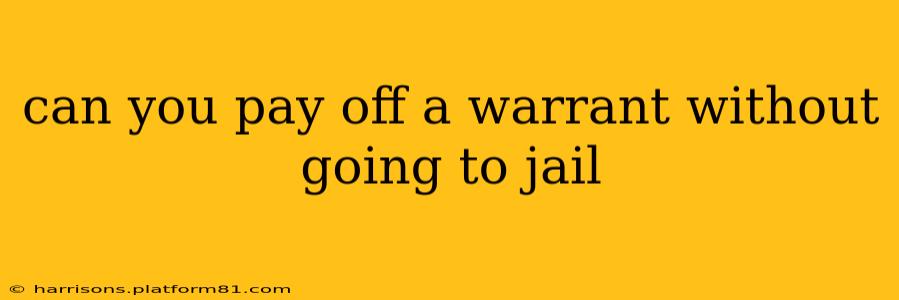Can You Pay Off a Warrant Without Going to Jail?
The short answer is: sometimes, but not always. Whether you can resolve a warrant without jail time depends heavily on several factors, including the type of warrant, the severity of the underlying offense, your criminal history, and the jurisdiction's policies. There's no one-size-fits-all answer, and attempting to navigate this situation without legal counsel is risky.
Let's explore the nuances of this complex issue:
What is a Warrant?
Before delving into payment options, it's crucial to understand what a warrant is. A warrant is a legal document issued by a court authorizing law enforcement to arrest someone. Warrants are issued for various reasons, ranging from minor traffic violations to serious felonies. The severity of the underlying offense dictates the potential consequences of being arrested on a warrant.
Can I Just Pay a Fine and Clear the Warrant?
This is a common misconception. While some minor offenses might allow you to resolve the matter by paying outstanding fines and fees, this isn't always the case, especially with more serious charges. Simply paying a fine rarely clears a warrant. The warrant signifies an outstanding legal obligation, often requiring more than just financial resolution.
What Happens If I'm Arrested on a Warrant?
Being arrested on a warrant can lead to several outcomes, depending on the circumstances:
- Immediate Arrest: You will likely be taken into custody and booked at a jail.
- Bail Setting: A judge might set bail, allowing you to be released from jail after posting a certain amount of money.
- Court Appearance: You will be required to appear before a judge to address the charges.
- Possible Jail Time: Depending on the severity of the offense and your criminal history, you could face jail time.
How Can I Resolve a Warrant Without Going to Jail?
The best approach to resolving a warrant without going to jail is to contact an attorney immediately. A lawyer can:
- Negotiate with the Court: They can work with the prosecuting attorney and the court to explore options such as plea bargains, community service, or alternative sentencing programs.
- Surrender Safely: Your attorney can arrange a safe and controlled surrender to the authorities, minimizing the risk of a more problematic arrest.
- Help You Understand Your Rights: They can explain your legal options and protect your rights throughout the process.
What If the Warrant is for a Traffic Violation?
For minor traffic violations, you might be able to resolve the warrant by paying outstanding fines and fees. However, it's essential to contact the court clerk or the relevant authority to confirm the process and ensure the warrant is officially cleared. Ignoring a traffic warrant can lead to more significant penalties.
What If the Warrant is for a More Serious Offense?
For more serious offenses, paying fines alone will almost certainly not resolve the warrant. You'll likely need to appear in court, potentially face charges, and possibly serve jail time. Seeking legal representation is critical in these cases.
Is There a Way to Find Out If I Have a Warrant?
Many jurisdictions allow you to check for outstanding warrants online through their court websites or law enforcement agencies. This is a prudent step if you suspect you might have a warrant. However, this should not replace consulting an attorney.
In conclusion, while there are circumstances where a warrant might be resolved without jail time, this often requires navigating complex legal procedures. Always seek legal counsel to determine the best course of action to address an outstanding warrant. Ignoring a warrant increases the risk of arrest and potentially more severe consequences.
